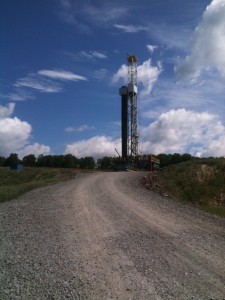All sides weigh in on draft drilling rules
-
Laura Legere
The Department of Environmental Protection has proposed 74 pages of revisions to the state’s oil and gas rules and speakers at a hearing on Monday night suggested edits on the draft.
People at the poles of the debate gathered at Tunkhannock High School in Wyoming County to call for an end to unconventional gas development or to urge DEP not to do anything that could slow or limit the industry’s rapid advance. Others in the divided room tried to speak for the center.
“We need compromise in the middle, which is what I think these proposed regulations represent,” said Wyoming County resident Kristin Landon, who told the panel of regulators that she lives within two miles of about 16 gas wells, a compressor station and a large water storage pond.
The proposed rules significantly change the current regulations for above-ground issues, like spill prevention, waste handling and the protection of special places and species. They would require precautions to help keep new shale wells from interfering with old, abandoned ones. (You can read our full guide here.)
Regulators have offered more time and opportunity for public input on these revisions than they do for most rules and permits. The hearing in Wyoming County was the seventh of nine being held across the state by the Environmental Quality Board, which oversees the creation of new regulations.
Many speakers suggested banning operators from burying waste at well sites and requiring companies to use tanks instead of pits for storage.
“It is true that tanks can and do leak and overflow as well,” Kate Gibbons, a representative of the environmental organization PennFuture, said. “But when tanks leak, it is clear that they are leaking, which is not the case with pits.”
Speakers proclaimed big ideas and parsed small phrases. They asked for clearer definitions of key terms in the regulations, like “pit” and “critical communities,” and disagreed about the meaning of the word “exceed.” Act 13, the state’s updated oil and gas law, requires drillers to restore damaged water supplies to the standards set by the Pennsylvania Safe Drinking Water Act or to its previous quality if the water exceeded those standards. DEP understands “exceed” to mean better than the standards; industry representatives have argued it means worse.
Scott Miller, a spokesman for natural gas company WPX Energy, asked that drillers be required to return a water supply to the quality measured during a pre-drilling test, “whatever that may be.”
“A large number of private wells are poorly constructed; many contain iron, manganese, coliform and methane, and many do not meet the criteria of the Safe Drinking Water Act,” he said.
Mark Cline, a fourth-generation oil man who traveled from McKean County to testify, said conventional drillers who operate shallow, low-pressure wells should be left out of the proposed rules.
“These new Chapter 78 regulations, the way they are now written, will destroy the conventional oil and gas business,” he said. “We support the Marcellus Shale industry but we should not be regulated the same.”
Peggy Maloof, a member of the League of Women Voters, got a cheer from like-minded audience members when she pushed for increased protections for public resources, like parks.
“It should be the industry’s responsibility to prove their actions will not be harmful,” she said, “and their executives should be held financially and criminally responsible for damages to public resources.”
The Environmental Quality Board recently extended the public comment period on the draft revisions by 30 days to March 14 and it will hold two additional hearings in Bradford and Warren counties on February 10 and 12.

















